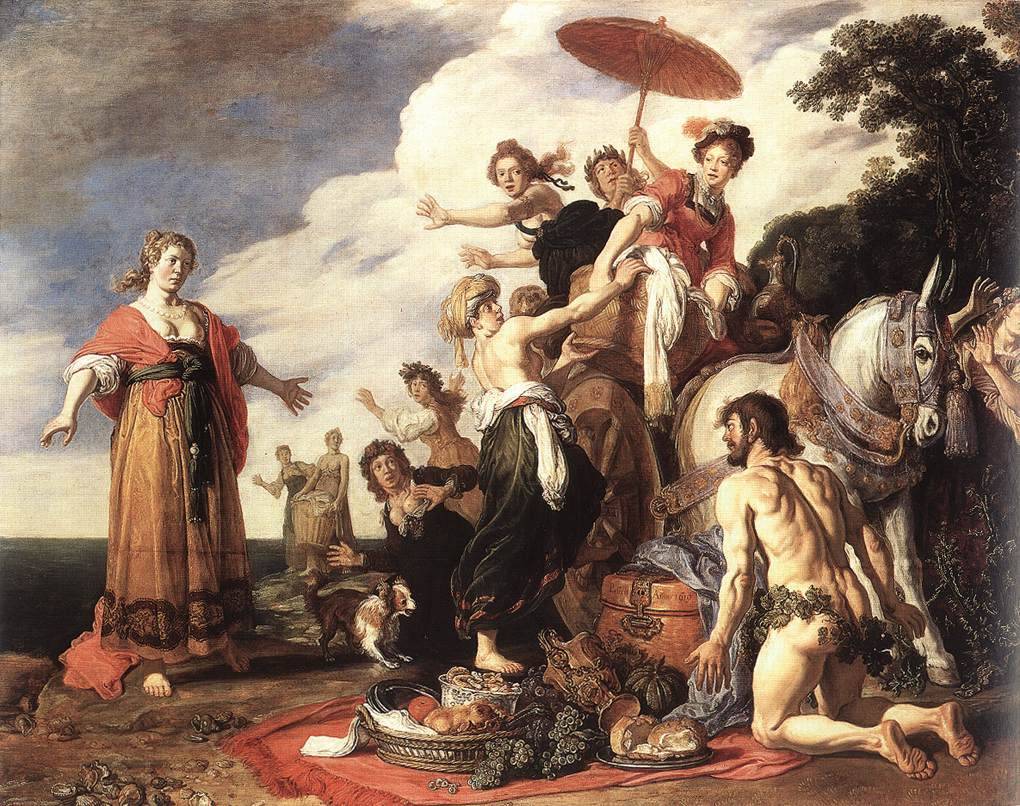
Thursday
Even as he sings his own praises as the guardian of Evangelical Christianity (“No President has done more for the Evangelical community, and it’s not even close”), our president plays the role of King Herod when it comes to immigrant children. Thousands are spending this Christmas in stark conditions, separated from their parents with little hope in sight. At least seven have died while in custody.
Meanwhile, the plan’s main architect, Stephen Miller, has been exposed as a white nationalist. In any other administration, he would have been long gone.
I’ve been reading Emily Wilson’s translation of The Odyssey, which I’ll be teaching in Sewanee’s “Representative Masterpieces” course, and am struck by how Homer handles the treatment of strangers.
With each island, the wandering Odysseus must figure out whether the inhabitants will be friendly or hostile. Sometimes he encounters cannibals, like the Laestrygonians and the Cyclops, with the former raining boulders down upon his boats and then spearing the Ithacans like fish. (The one-eyed giant Polyphemus, meanwhile, bashes Odysseus’s men against rocks and devours them raw.) On the other hand, the Phaeacians treat strangers with respect.
To be sure, even they have an instinctive wariness of foreigners, and they have reason. Odysseus and his men are themselves fully capable of being the “rapists and murderers” that Trump warns us about. We have from Odysseus how he and his men treat the inhabitants of the first island they encountered:
A blast of wind pushed me off course towards
the Cicones in Ismarus. I sacked
the town and killed the men. We took their wives
and shared their riches equally among us.
Even with Polyphemus, the men are only too ready to steal the giant’s goats and sheep before he returns. In the epic’s other story, meanwhile, Telemachus is asked by Nestor,
Strangers, who are you? Where did you sail from?
Are you on business, or just scouting round
like pirates on the sea, who risk their lives
to ravage foreign homes?”
The Phaeacian king’s daughter, the first person Odysseus encounters on the island, coaches him on how to circumvent her father’s potential hostility. To show he is no threat, he must approach the queen first and then abase himself in the ashes.
Once he does so, a senior advisor speaks up for him. From him we hear that Zeus “loves the needy”:
Alcinous,
you know it is not right to leave a stranger
sitting there on the floor beside the hearth
among the cinders. Everyone is waiting
for you to give the word. Make him get up,
and seat him on a silver chair, and order
wine to be poured, so we may make libations
to Zeus the thunderlord, who loves the needy.
The house girl out to bring the stranger food
out from the storeroom.
The king agrees, saying to the wine boy,
Go and mix
a bowl and serve the wine to all our guests,
so we may offer drink to thundering Zeus
who blesses those in need.
In the other story, Menelaus says something similar when asked how Telemachus should be treated. The guard speaks first:
“Your Majesty, there are two men outside,
strangers who seem like sons of Zeus. Please tell me,
should we take off the harness from their horses?
Or send them off to find another host?”
Flushed Menelaus shouted angrily,
“You used to have some brains!
Now you are talking like a silly child.
We two were fed by many different hosts
before returning home. As we may hope
for Zeus to keep us safe in future times,
untack their horses! Lead them in to dine!”
Earlier when he is still in Ithaca, Telemachus too models hospitality, welcoming a stranger at his door—who, as it turns out, is the goddess Athena in disguise. One never knows the gifts that a foreigner may be bringing you.
Homer distinguishes the civilized and uncivilized by how they treat strangers. At times in its history, America has been big-hearted like Nestor, Menelaus, Alcinous, and Telemachus, at times tribal and insular like the Laestrygonians and the Cyclops. A rich network of mutually beneficial relationships arises out of the first. Polyphemus, by contrast, lives alone in his mountain cave:
There lived a massive man
who shepherded his flocks all by himself.
He did not go to visit other people,
but kept apart, and did not know the ways
of custom. In his build he was a wonder,
a giant, not like men who live on bread,
but like a wooded peak in airy mountains,
rising alone above the rest.
This isn’t far from Trump’s view of America. Like the Cyclops, he sees us as towering above the rest of the world in solitary splendor. Like the Cyclops, he regards all visitors as potential threats and treats them accordingly.